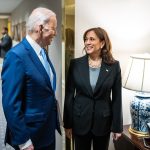Robert F. Kennedy Jr. made headlines on Thursday with a scathing criticism of Vice President Kamala Harris, leaving no stone unturned as he blasted her party’s current direction. In a statement on social media, Kennedy declared he has absolutely no plans to endorse Harris, much to the chagrin of those who thrive on identity politics. A recent report from The Washington Post added some juicy details, suggesting that Kennedy had initially sought a meeting with Harris to discuss a potential Cabinet position—but apparently, she wasn’t keen on having him aboard.
Kennedy’s post quickly illuminated his reasons for rejecting the idea of a Harris endorsement. He argued that the Democratic Party, under Harris’s leadership, would be barely recognizable to his father, Robert F. Kennedy, and uncle, John F. Kennedy. He lamented how the current party has strayed far from the principles of civil liberties and free speech that once defined it. Instead, he accused Harris’s Democratic Party of being an embodiment of censorship, lockdowns, and medical coercion, seemingly hoping to resurrect a discussion around the party’s radical transformation over the decades.
VP Harris’s Democratic Party would be unrecognizable to my father and uncle and I cannot reconcile it with my values.
The Democratic Party of RFK and JFK was the party of civil liberties and free speech. VP Harris‘s is the party of censorship, lockdowns, and medical coercion.…
— Robert F. Kennedy Jr (@RobertKennedyJr) August 15, 2024
Kennedy didn’t stop there. He deftly cited how Harris had spent considerable time misleading the public about the health of the nation’s Commander in Chief. So much for transparency, right? He made it clear he is not just going to sit back and take it—Kennedy mentioned his strategic plans to defeat Harris instead of endorsing her, which is a rather bold statement considering the rocky terrain of politics today.
What’s even more intriguing is Kennedy’s apparent outreach to former President Donald Trump, discussing a policy role and an endorsement on health issues. It seems the political family tree is blossoming in unexpected ways. Kennedy emphasized that open communication and collaborative discussions are essential to unify the country—a sentiment that would make any casual onlooker chuckle at the irony considering Harris’s handle on dissenting opinions.
In a predictable twist, Harris’s team has remained silent in the face of Kennedy’s advances, perhaps failing to recognize the political opportunity in engaging a prominent figure from their past. Kennedy thinks such a lack of response could turn out to be detrimental for the VP’s campaign, an assessment a great many would agree with, especially given the contentious atmosphere leading up to the election. Lack of engagement could be a strategic blunder in what promises to be a nail-biter of a race.




